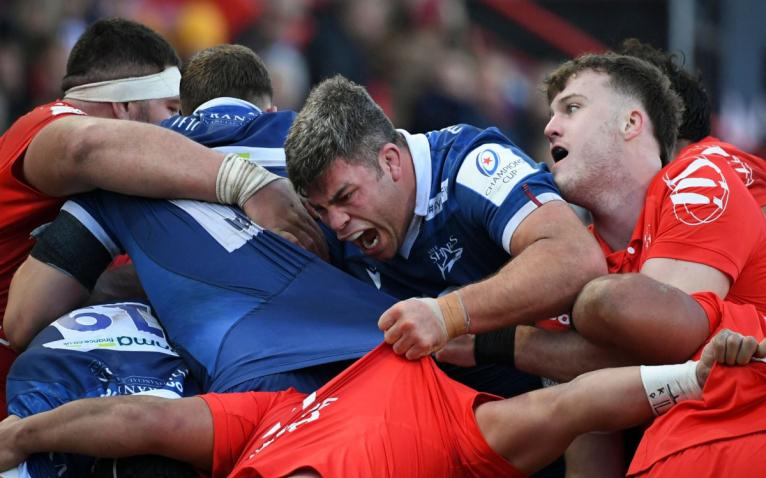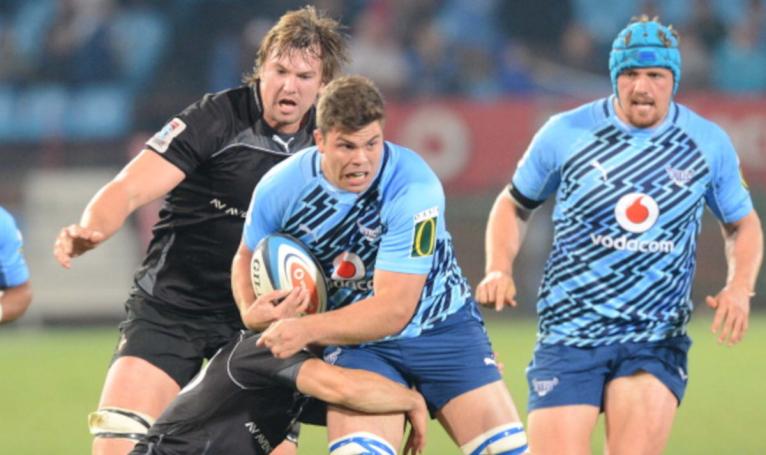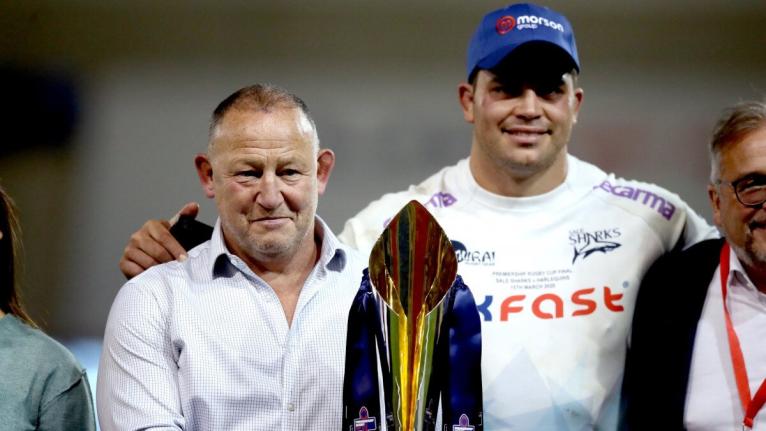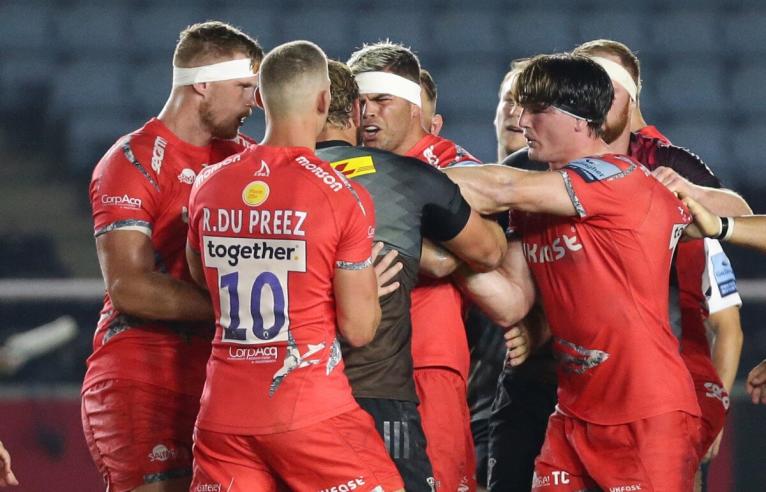On Saturday afternoon, Jono Ross thundered between two Gloucester tacklers and struck sweet Kingsholm paydirt. A bellow of pure, visceral passion tore from his lungs. Sale, bound for a Mancunian semi-final, a constant presence near the summit of a topsy-turvy Premiership.
Six days later, Ross announced his impending retirement from rugby. For six seasons, he has been Sale’s colossus. For five of them, he was their captain. A leader of men, setter of standards, taker of opposition bodies. Assured and thoughtful off the pitch, unrelentingly belligerent on it. Of all the gilded South Africans to have set up camp in Salford, Ross’ influence has been the most telling.
At 32, the back-row is no creaking warhorse, but his body has started to grumble. A toe injury continues to plague him. Four concussions in eight months during the 2020-21 season were anxiety-inducing. He has a young daughter, another child due next month, and is ready to return to his African roots. Come summer, the family will move to Zimbabwe, where Ross’ wife Haley is from, and where he will rear cattle and grow his fledgling logistics business.
“Retirement was always a huge fear – what am I going to do when I’m done? This is the most comfortable I’ve ever been with finishing up,” he tells RugbyPass+.

“I don’t want to work for anyone else, I want to work for myself and have time with my family. Covid was a huge game-changer for us, we were stuck over here, couldn’t see family and you realise what’s important. Time with family, having my weekends, being able to plan after years of not being able to, I’m really excited for what’s to come.
“Although I’m not old, I’ve played a significant number of minutes over the last ten years. I’m not enjoying it quite as much as I used to. My body is tired.”
Little wonder, given the sheer volume of walloping, smashing and clattering that frame has taken, like a dented truck in a demolition derby. Ross has played close to 300 professional matches in South Africa, France and England. He frequently topped the Premiership charts for tackles, dominant or otherwise.
And his journey to get here was fraught with challenges – no Super Rugby gig straight out the gate back home, a quick spell in Harlequins’ wider squad, in and out of the Bulls youth set-up, and the briefest of stints with Saracens in 2012, before the Bulls brought him back the following year.
The public forget players are just people. You can never say anything back otherwise you’re crucified. I’d love to have replied to a few messages in my time.
Even then, as a relative pup, Ross’ leadership qualities were obvious. The Bulls, whose fabric is woven so tightly through the Afrikaans culture, made him their first English-speaking captain. But as Springbok giants moved on, the team endured a trying Currie Cup season and Ross took heavy fire.
“I tried to speak as much Afrikaans as I could,” he says. “You’ve got to respect the culture and Afrikaans is massive at the Bulls. I tried to buy into that.
“It was one of the toughest points in my career. We struggled quite a bit and I took a lot of criticism. Although I didn’t necessarily read that stuff, Twitter makes you so accessible to people and people can be so nasty and horrible. My family would read that and get upset.
“Some of the criticism was justified but sometimes I think the public forget players are just people. I understand there is passion, fans pay to watch and have a right to criticise, but you are just a person trying your best.
“And as a player, you feel you can never say anything back otherwise you’re crucified, you’re a bad person – and I know that’s a sentiment felt throughout the sport. In rugby, for some reason, you have to follow moral standards when others never do. They can say what they like but you can’t have a go back at them, which bothered me over the years because I’d have loved to have replied to a few messages in my time.
“It was extremely challenging but a great time at the Bulls. I loved it. They gave me an opportunity to captain and that put me on the map.”

Ross uprooted enough trees in Pretoria to have ears pricking up across Europe. He moved to Stade Francais in 2015, won the Top 14 in his first season and the European Challenge Cup in his third. He revelled in the food and the vibe and the history of the sleek French capital. But when talk of financial ruin and an unthinkable merger with fierce rivals Racing 92 emerged, he felt compelled to leave.
“Paris is one of the best cities in the world. We immersed ourselves in it. We lived on the 16th arrondissement, right in the mix; we had a scooter and drove around on it; we loved Paris.
“Winning the Top 14 was unbelievable. Towards the end the merger was really stressful. I don’t think there’s a derby like Stade-Racing in world rugby as intense or with as much hatred. English clubs talk about derbies but it’s not the same.
“This situation was created and it was tough because on one hand you want a contract, which I would have been offered had the clubs joined, and on the other hand you want to save the club which is so steeped in history. I was by no means in support of the merger.
“When the owner at the time said, ‘if no-one buys the club there will not be contracts, the club will be dissolved’, I said, ‘look, I’ve got to find a contract and safeguard my family’.
“My wife misses Paris massively, I miss Paris, but I don’t regret anything that’s happened. We will always look back on our time really fondly and be thankful it happened.”
It would be a stretch to call Sale a glamorous destination, such is the earthy soul of the place, but back in 2017 when Ross was chewing over a move, there was no talk of titles or trophies or the upper echelons of the English game. Sale hadn’t made the play-offs since winning the Premiership eleven years earlier.
Steve Diamond could sell ice to an Eskimo. A few Stade players were saying, ‘you’re going to a nothing club’.
But investment was coming. Local entrepreneur Simon Orange had bought the club and pledged to fund its ambitions. Orange and Steve Diamond, the Sharks’ rugged figurehead, made their pitch and Ross was sold. These days, two years after leaving his post, Diamond still refers to his former captain as an extra son.
“I remember sitting down with Steve – he could sell ice to an Eskimo. He spoke about the project he wanted to develop. There are not many more passionate guys about Sale than Simon. They spoke about what they want to achieve. I wanted to be part of this, I wanted to help pull the club from average to going somewhere.
“A few of the Stade players were saying, ‘you’re going to a nothing club, they haven’t won much’. I thought, yeah, that’s fine. I knew where the club wanted to go, I knew some of the players they wanted to sign, and I thought it was a great opportunity for me. It clicked from day one.”
Progress has taken time. Ross was made skipper in his debut campaign and has vivid memories about the looming spectre of relegation. Sharks won two of their opening eight matches and hovered above the trapdoor.

It has been a long time since any Sale folk have fretted over their league position. Diamond drove them to within a Covid outbreak of a league semi-final in 2020. Alex Sanderson took over and pushed them higher still, to European knockouts and Premiership play-offs. This season, Sale have not fallen out of the top two since the opening rounds.
“We definitely were worried about relegation back in 2017; I remember worrying we would go down. I would love to see relegation back in the Premiership because I think it makes it all the more exciting.
“We probably hit our ceiling under Dimes, and Al has taken over and we’ve gone to another level. There has been huge growth. A lot of that is down to investment, but we lost world-class players last year like Faf de Klerk and Lood de Jager, and Gus Warr and Raffi Quirke have stepped in, Jonny Hill has come in, young guys like Bevan Rodd, Joe Carpenter, Tom Roebuck, have stepped up. The personnel, age profile, quality within that squad can compete for years to come. Lots can be improved – it’ll probably help getting rid of a few of us old guys.”
Ross is intriguing company on the state of English rugby. The top flight has lost Worcester and Wasps to administration, while grim rumours about others on the brink circulate, and the competition operates under a reduced salary cap.
The salary cap is killing the English game. It holds teams back. I don’t understand how teams can compete in Europe.
“Europe is getting tougher because the salary cap is killing the English game in a lot of ways,” Ross says. “I understand they want to keep the Premiership competitive but if you want it to be competitive, why not have relegation? And if you don’t have relegation, why not allow teams to spend what they are able to? If Worcester, for example, only spent what they were able to spend, what’s the worst that would happen to them? They’d finish last. Newcastle spend significantly less than any other team yet they are competitive.
“I do think the cap holds teams back. When we played Toulouse, they had three international full-backs, they brought a front-row off the bench who are all internationals. I don’t understand how English teams are expected to compete against that.
“I understand the need for sustainability, it isn’t sustainable having owners chucking millions down the drain. I would like to see teams spend what they are able to afford.”
Ross has thoughts on the behaviour of club owners, too.
“I would like there to be an independent board who look at the books and say, ‘Sale, you can spend this, Newcastle, you can spend that’. At some stage the Premiership needs a game board independent from the owners who make decisions for the sustainability of the English game.
“I just feel at the moment the people who are running the Premiership are owners. They do a lot for their own interests which I completely understand but is it in the interests of everyone in the game? I don’t think it is.
“The pay cuts during the pandemic was a huge one. I don’t think every club had to cut players. But these guys are intelligent people, saw an opportunity to bring down the wage bill and they did it. I don’t think that’s fair on the players for what they do. There has been an issue with agents, and agents’ fees coming out of players pockets, making it more difficult. Bringing down the cap has obviously impacted the quality of teams.”

And what about the end? Alongside the Curry boys and the Du Preez destroyers, Ross is still contributing at the top level. He started at No 8 in the win at Kingsholm and is guaranteed a Salford farewell, against Newcastle in a fortnight or the semi-final against Leicester thereafter. The semi could be his 150th Sharks game. How dearly he would love to bring down the curtain on a podium at Twickenham, hoisting aloft the Premiership crown.
“It would be a special way to bow out. The game has given me a hell of a lot, the opportunity to travel the world, the lifetime friends I’ve made. You’ll miss the roar of the stadium, the changing room, the training ground. But it can’t go on forever.
“From where we started at Sale to where we are now, I’ll look back with a huge amount of pride. Sale is a bit different to a lot of clubs, still a bit rough around the edges, and that’s what makes it special.
“There will be a bit of sadness but I’m as ready as I ever will be.”
The black thatch protruding from the matchday headband is now flecked liberally with grey. The redoubtable body does not cooperate as freely as once it did. The bell is tolling for the final round. But what a round.



A real trooper for Sale.
Think i can speak for a lot of our fans when i say we'll miss his presence.